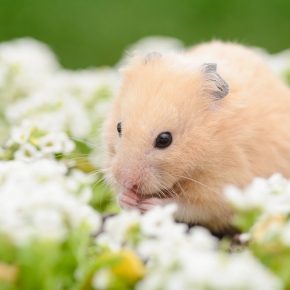
Growing Goodness: The wonders of edible gardens for small pets
March 14, 2024
[CE_Social_Sharing]What better way to celebrate the arrival of spring in Wiltshire and Somerset than by growing an edible garden for your small furry pets? Whether you have rabbits, guinea pigs, hamsters, gerbils or other small pets, cultivating an edible garden not only provides them with fresh and nutritious treats but can also offers a rewarding and interactive experience for both pet and owner.
In this article, Garston Vets’ nursing team share the benefits of growing an edible garden for your pet, as well as tips on which foods to plant and what you’ll need to get started. Plus, download our step-by-step guide on how to:
Grow an Edible Garden for Small Furry Pets
Choosing the right edible garden
When it comes to edible gardens for small pets, there are two ways you can go. Garston Vets’ team of nurses think you’ll probably end up wanting to build both!
Option 1 – Grow an edible garden for you to harvest
Creating an area in your Wiltshire and Somerset garden to grow your own fruit & vegetables that can supplement your pet’s diet is a win-win on many levels; home-grown foods are super fresh and full of essential nutrients, they are free from chemicals (when you don’t user chemical fertiliser or pesticides), often cheaper than buying from the shop, and there’s no plastic wrappers to throw away. Plus, gardening can be fun and rewarding!
Our nurses can recommend several common vegetables that you can grow in your garden which are suitable for rabbits, guinea pigs, hamsters, and gerbils. These include:
- Carrots: Rich in vitamin A and provide essential nutrients for these small pets.
- Lettuce: Leafy greens (e.g. romaine, green leaf & red leaf lettuce) are safe in moderation.
- Kale: High in vitamins and minerals; give in moderation due to its calcium content.
- Spinach: Give in moderation due to its oxalic acid content.
- Broccoli: Rich in vitamins & minerals, including vitamin C, give in small amounts as a treat.
- Bell Peppers: Provide essential nutrients such as vitamin C, can be fed raw or cooked.
- Cucumber: Low in calories and provides essential hydration for these small pets.
- Zucchini: Low in calories, provides essential vitamins & minerals, can be fed raw or cooked.
When feeding fresh vegetables from your garden to rabbits, guinea pigs, hamsters, and gerbils, it’s essential to wash them thoroughly and provide them in appropriate portion sizes. Introduce new foods gradually and monitor your pet for any adverse reactions. Additionally, talk to our Wiltshire and Somerset nurses about providing a balanced diet tailored for your small pet – get in touch.
Option 2 – Grow an edible garden for your pet to forage in
You can create an interactive and enriching experience for your pet by building an edible garden they can forage in, which will mimic their natural wild behaviours.
The materials you will need will depend on the type of small furry pet you have. For rabbits and guinea pigs you’ll need a large plant pot or trough that can be moved in and out of their hutch easily, or placed in an outdoor run that isn’t accessible all the time. For hamsters and gerbils, you’ll need a second cage (we suggest checking online for second hand ones) that you can place a pet-safe plastic tray inside. It’s wise not to give your pet access to their garden all the time so they don’t eat everything in one sitting!
It’s Gardening Time!
You’ll need to remember that ‘gardening time’ for your small furry pet will be messy – they will dig, rip up, throw things out and basically undo all your hard work, but they’ll have so much fun doing it! You could make this a weekend fun activity and have a few trays or troughs growing at the same time that you can swap in and out, doing a little maintenance and replanting along the way!
To get you started, Garston Vets’ team of nurses have shared some examples of edibles you can grow, sow, or throw into your planter or tray:
- For rabbits: Mint, parsley, basil, dill, and carrot tops.
- For guinea pigs: Bell peppers, strawberries, cilantro, and kale.
- For hamsters: Dandelion leaves, sunflower seeds, and small amounts of broccoli.
- For gerbils: Blueberries, cilantro, and small amounts of apple.
For a list of the materials you will need and additional seeds you can buy, plus instructions on how to build your pet’s very own edible garden, download our ‘how to’ guide: